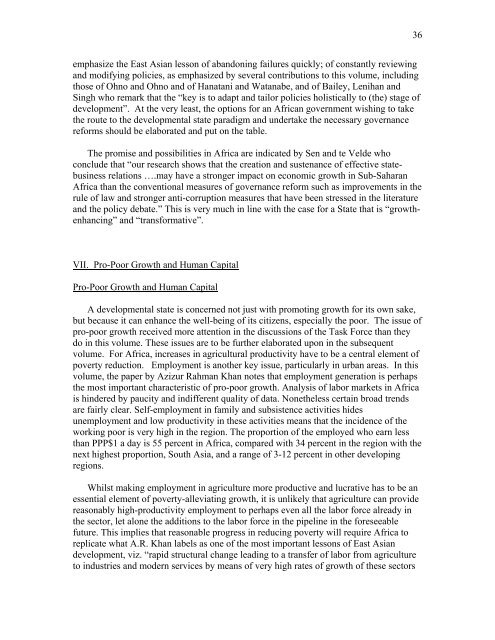Paper - Initiative for Policy Dialogue
Paper - Initiative for Policy Dialogue
Paper - Initiative for Policy Dialogue
Create successful ePaper yourself
Turn your PDF publications into a flip-book with our unique Google optimized e-Paper software.
36<br />
emphasize the East Asian lesson of abandoning failures quickly; of constantly reviewing<br />
and modifying policies, as emphasized by several contributions to this volume, including<br />
those of Ohno and Ohno and of Hanatani and Watanabe, and of Bailey, Lenihan and<br />
Singh who remark that the “key is to adapt and tailor policies holistically to (the) stage of<br />
development”. At the very least, the options <strong>for</strong> an African government wishing to take<br />
the route to the developmental state paradigm and undertake the necessary governance<br />
re<strong>for</strong>ms should be elaborated and put on the table.<br />
The promise and possibilities in Africa are indicated by Sen and te Velde who<br />
conclude that “our research shows that the creation and sustenance of effective statebusiness<br />
relations ….may have a stronger impact on economic growth in Sub-Saharan<br />
Africa than the conventional measures of governance re<strong>for</strong>m such as improvements in the<br />
rule of law and stronger anti-corruption measures that have been stressed in the literature<br />
and the policy debate.” This is very much in line with the case <strong>for</strong> a State that is “growthenhancing”<br />
and “trans<strong>for</strong>mative”.<br />
VII. Pro-Poor Growth and Human Capital<br />
Pro-Poor Growth and Human Capital<br />
A developmental state is concerned not just with promoting growth <strong>for</strong> its own sake,<br />
but because it can enhance the well-being of its citizens, especially the poor. The issue of<br />
pro-poor growth received more attention in the discussions of the Task Force than they<br />
do in this volume. These issues are to be further elaborated upon in the subsequent<br />
volume. For Africa, increases in agricultural productivity have to be a central element of<br />
poverty reduction. Employment is another key issue, particularly in urban areas. In this<br />
volume, the paper by Azizur Rahman Khan notes that employment generation is perhaps<br />
the most important characteristic of pro-poor growth. Analysis of labor markets in Africa<br />
is hindered by paucity and indifferent quality of data. Nonetheless certain broad trends<br />
are fairly clear. Self-employment in family and subsistence activities hides<br />
unemployment and low productivity in these activities means that the incidence of the<br />
working poor is very high in the region. The proportion of the employed who earn less<br />
than PPP$1 a day is 55 percent in Africa, compared with 34 percent in the region with the<br />
next highest proportion, South Asia, and a range of 3-12 percent in other developing<br />
regions.<br />
Whilst making employment in agriculture more productive and lucrative has to be an<br />
essential element of poverty-alleviating growth, it is unlikely that agriculture can provide<br />
reasonably high-productivity employment to perhaps even all the labor <strong>for</strong>ce already in<br />
the sector, let alone the additions to the labor <strong>for</strong>ce in the pipeline in the <strong>for</strong>eseeable<br />
future. This implies that reasonable progress in reducing poverty will require Africa to<br />
replicate what A.R. Khan labels as one of the most important lessons of East Asian<br />
development, viz. “rapid structural change leading to a transfer of labor from agriculture<br />
to industries and modern services by means of very high rates of growth of these sectors














